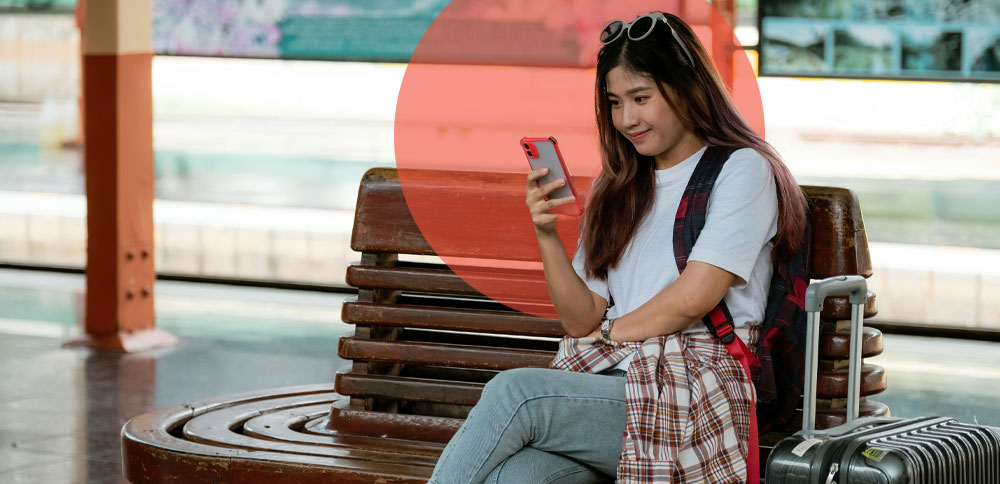Gearing up for a summer adventure?
Unless it’s some kind of “digital detox” retreat (in which case, good for you!), your trusty gadgets will be along for the ride. But be warned: hotels and sketchy Wi-Fi networks are a data thief’s dream.
So, let’s not give those bad actors the satisfaction. To ensure you can soak up the sun without sweating over your digital safety, check out our 6 tips and must-have checklist for data protection and privacy on vacation.
Pack light and keep track of your belongings
Traveling with family or friends? Sounds great, but keep in mind your list of packed devices will only multiply.
With that in mind, do your best to pack electronics on a need-to-bring basis and remind your companions to do the same. It’s worth it to reduce the risk of something getting lost or stolen.
When you’ve reached your vacation destination, keep your electronics on you when you can. And when you can’t, keep them stored out of sight—like locked and covered in your car’s trunk or locked in your hotel room’s safe.
Before you leave for your trip is a great time to make sure your devices have completed any necessary updates, and you can even turn on “automatic updates” to help you stay protected against the latest security concerns.
Keep your devices updated and in check
We’re not going to point fingers, but it’s safe to say that some of us have been putting off a smartphone software update or two.
Before you leave for your trip is a great time to make sure your devices have completed any necessary updates, and you can even turn on “automatic updates” to help you stay protected against the latest security concerns.
And let’s not forget, even with the utmost precautions in place, sometimes theft happens. Just in case, take our advice to safeguard your devices and the data they carry.
- Turn on screen and app lock features, like passwords or biometrics (i.e., face ID or thumbprint)
- Back up your devices so that even if they get stolen, you’ll still have access to your data
- Turn on the “Find my device” feature to allow you to track your electronics if they’re missing, or even remotely wipe and/or disable the device if needed
Avoid public computers and chargers
A public computer in a hotel lobby or Internet café can be awfully handy, but keep in mind it’s not safe for any sensitive activities. Keylogging or infostealer malware on these computers can capture your keystrokes, meaning that anything you type, including passwords and personal information,
could be at risk. Keep your activities generic and avoid logging in to any personal accounts.
And did you know that malware can also be loaded onto public USB charging stations? For that reason, consider carrying a portable charger with you on your trip or, in public locations, choose AC power outlets for charging rather than unknown USB cables or charging outlets.
A public computer in a hotel lobby or Internet café can be awfully handy, but keep in mind it’s not safe for any sensitive activities.
Use caution with public Wi-Fi
Public Wi-Fi is… well, public. And that makes it a bit of a mystery: we have no way of knowing how it’s set up, who’s monitoring it, and who has access.
This doesn’t mean you should never use a public Wi-Fi network; it’s just a matter of being conscious of your public screentime. For instance:
- Disable automatic connection to open Wi-Fi networks to avoid accidentally connecting to a shady source
- Avoid using a public Wi-Fi network for sensitive information, like banking information or personal details
- Turn on and password-protect your smartphone’s hotspot feature if you need to access sensitive information. Your hotspot is a personal, short-range Wi-Fi network that you can use to access the internet through your phone’s mobile data
Post with care on social media
In 2024, making memories also means sharing them on your favourite social media app.
But especially if you have a public-facing account, you may have more eyes on your feed than you realize. And you don’t necessarily want to advertise to that audience that your home is unattended.
Here’s the good news:
You can adjust your social media privacy settings while you’re away, so only the people you trust can catch your vacation updates in real time. Or hold off on hitting “post” until you’re safely back home.
Regardless, avoid posting pictures of boarding passes, passports, or other documents to help protect your identity and personal information.
By following these simple guidelines, you can ensure that your journey is not only safe and secure but also fun and memorable! Safe travels!


